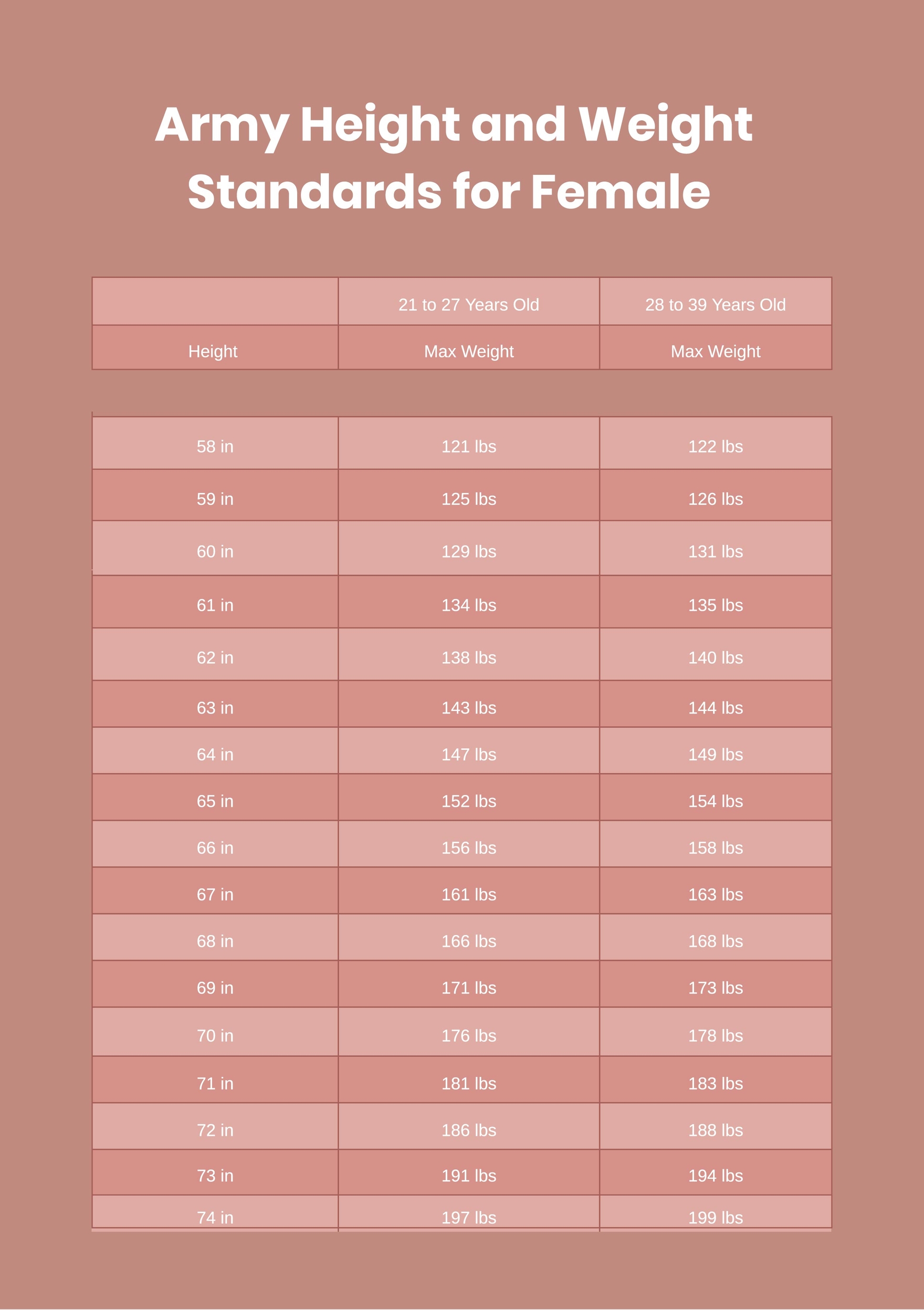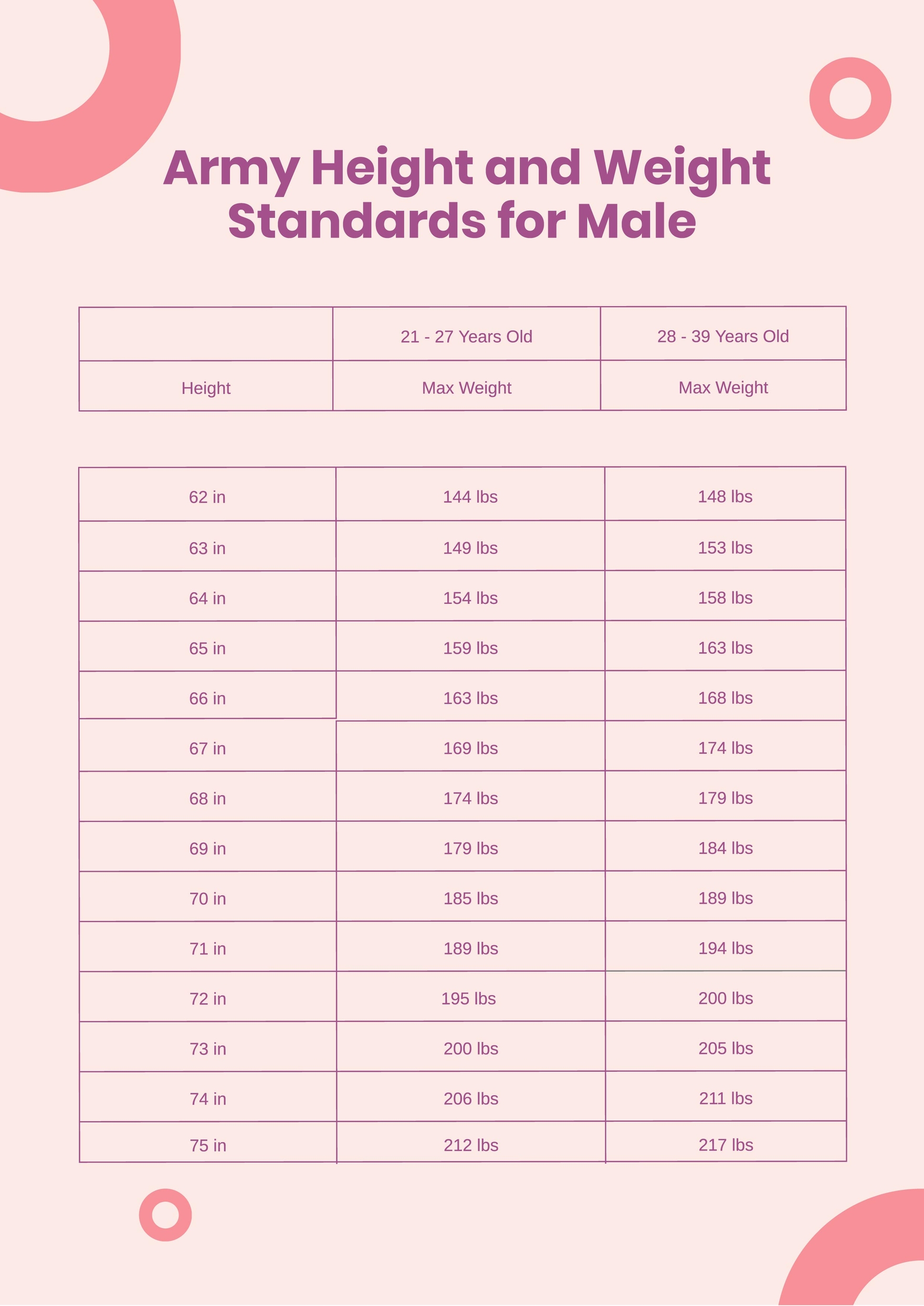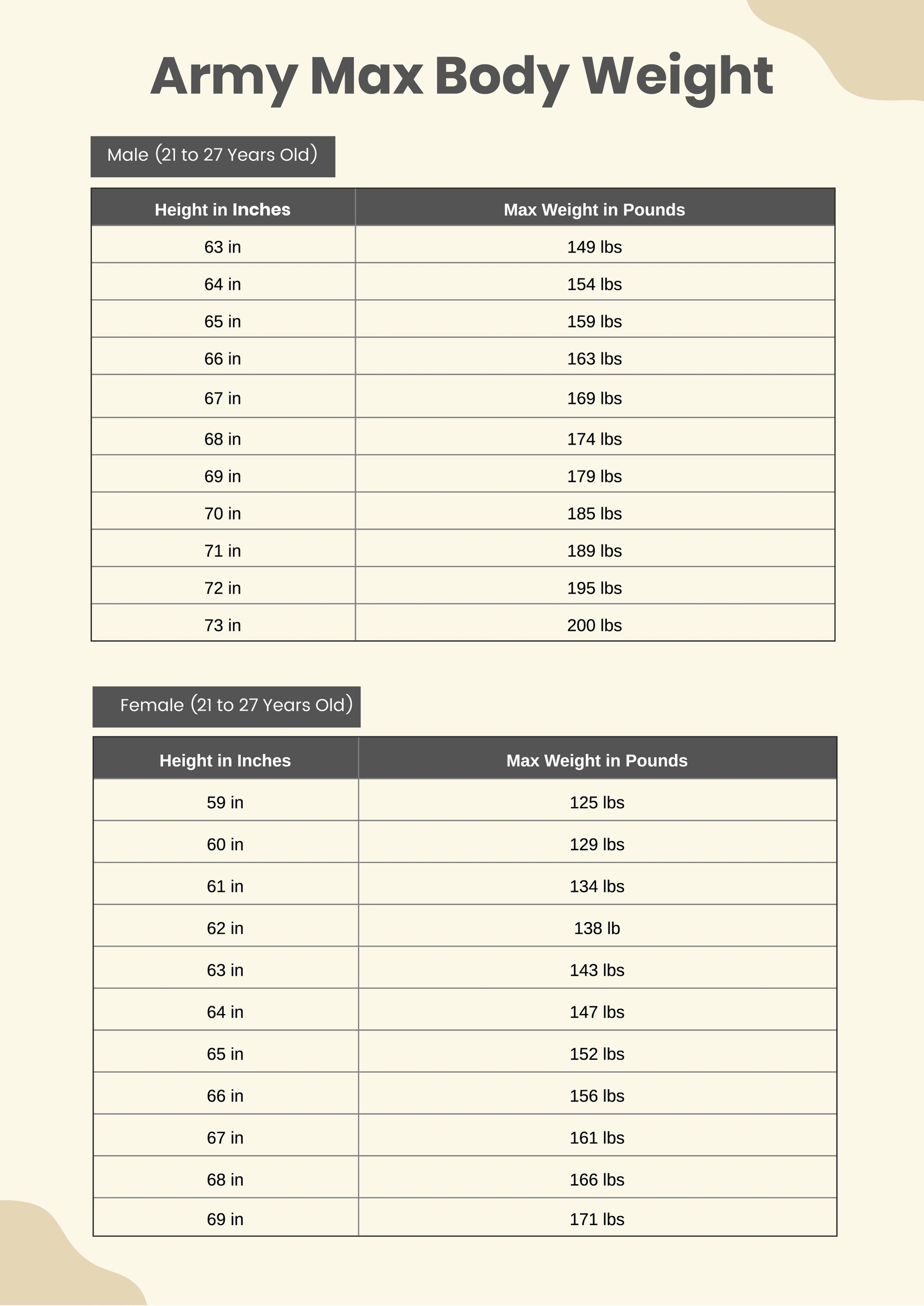Military Height And Weight Requirements: What You Need To Know Before Enlisting
So, you're thinking about joining the military? That's awesome, but hold up a sec. Before you dive headfirst into Uncle Sam's world, there's something crucial you need to know: the military height and weight requirements. Yep, the armed forces aren't just looking for guts and glory; they want you to fit a certain physical profile. Let's break it down, shall we?
Now, you might be wondering, "Why does the military care so much about height and weight?" Well, it's not just about aesthetics or making sure everyone looks sharp in that uniform. It's about ensuring soldiers are physically fit and ready to tackle any mission that comes their way. This isn't just about looking good; it's about being in top shape for the job.
But don't sweat it too much yet. We're here to guide you through the ins and outs of military height and weight requirements. Whether you're eyeing the Army, Navy, Air Force, or Marines, this article will give you the scoop on what you need to know. Let's dig in!
- Sag Woman Traits Unlocking The Unique Qualities Of Women Born Under The Zodiac Sign
- Hello Kitty Characters The Ultimate Guide To Sanrios Beloved Icons
Understanding the Importance of Military Height and Weight Standards
First things first, why does the military have height and weight standards in the first place? It's not just some arbitrary rule they pulled out of thin air. These requirements are all about ensuring that service members are physically capable of handling the demands of military life. Picture this: you're out in the field, carrying heavy gear, running long distances, and maybe even engaging in combat. If you're not in peak physical condition, you're not just putting yourself at risk—you're potentially jeopardizing your team's mission too.
Why Fitness Matters in the Military
Fitness in the military isn't just about looking fit; it's about being fit to fight. The physical demands of military service are no joke. Whether you're in the infantry, aviation, or logistics, there's a good chance you'll be required to perform physically demanding tasks. And let's face it, if you're too heavy or not strong enough, you're going to struggle. That's why the military takes height and weight so seriously.
What Are the Military Height and Weight Requirements?
Alright, let's get down to brass tacks. So, what exactly are the military height and weight requirements? Well, it varies depending on which branch you're looking to join. But generally speaking, the military uses a Body Mass Index (BMI) chart to determine if you meet the standards. BMI is a calculation that takes into account your height and weight to estimate your body fat percentage. Here's a quick breakdown:
- Elyse Myers Religion Unveiling The Spiritual Journey Of A Rising Star
- Unveiling Verza Your Ultimate Guide To A Thriving Digital Marketplace
- Army: For men, the maximum allowable weight ranges from 138 pounds for someone who's 5'0" to 240 pounds for someone who's 6'6". For women, it's 116 pounds for 5'0" to 200 pounds for 6'2".
- Navy: Similar to the Army, but with slightly different ranges. Men can weigh between 144 pounds at 5'0" to 250 pounds at 6'6". Women can weigh between 120 pounds at 5'0" to 210 pounds at 6'2".
- Air Force: The Air Force uses a different system, focusing more on BMI rather than just height and weight. For example, a man who's 5'10" should ideally have a BMI of around 25 or less.
- Marines: The Marine Corps is a bit stricter, with lower maximum allowable weights across the board. For instance, a 5'10" man should weigh no more than 174 pounds.
How Do They Measure BMI in the Military?
Now, you might be wondering how they actually measure BMI in the military. It's not as simple as stepping on a scale. The military uses a combination of height, weight, and circumference measurements (like waist and neck) to calculate your BMI. This gives them a more accurate picture of your body composition. So, even if you're technically within the weight limits, if your waist measurement is too high, you might still fail the test.
Common Misconceptions About Military Height and Weight Standards
There are a lot of myths floating around about military height and weight requirements. Let's clear some of them up, shall we?
- Misconception #1: If you're overweight, you can't join the military. Not necessarily true. If you're close to the limit, you might be given a chance to lose weight before enlisting.
- Misconception #2: Muscular people always pass the test. Wrong. If you're heavily muscled, your BMI might still be too high, even if you're in great shape.
- Misconception #3: Women have the same standards as men. Nope. Women generally have slightly higher allowable weight limits than men.
What Happens If You Don't Meet the Standards?
If you don't meet the military's height and weight requirements, don't panic just yet. Depending on the branch and the situation, you might be given a chance to improve. For example, some branches offer a "deferment" period, where you can work on losing weight or getting in better shape before officially enlisting. But if you're way off the mark, you might need to reconsider your options.
Tips for Meeting the Military Height and Weight Requirements
So, how can you make sure you meet the military's height and weight standards? Here are a few tips:
- Start exercising regularly. Cardio and strength training are both important for getting in shape.
- Watch what you eat. A balanced diet with plenty of fruits, vegetables, lean protein, and whole grains will help you maintain a healthy weight.
- Stay hydrated. Drinking plenty of water can help with weight management and overall health.
- Get enough sleep. Rest is crucial for recovery and maintaining a healthy metabolism.
How to Prepare for Basic Training
Once you've met the height and weight requirements, it's time to start preparing for basic training. This is where the real physical challenges begin. Here are a few things you can do to get ready:
- Work on your cardio. Running is a big part of basic training, so start building up your endurance.
- Focus on core strength. A strong core will help you with all sorts of physical tasks.
- Practice carrying weights. You'll be carrying gear, so it's a good idea to get used to it.
Real-Life Stories: Success and Challenges
Let's hear from some real people who've faced the military height and weight requirements. John, a former Marine, struggled with his weight before enlisting. "I was about 20 pounds over the limit," he says. "But I worked hard, changed my diet, and started exercising regularly. By the time I went to basic training, I was in great shape." Meanwhile, Sarah, an Army veteran, had a different experience. "I was always fit, but I had to watch my waist measurement carefully," she explains. "Even if you're within the weight limits, you can still fail if your waist is too big."
Data and Statistics
According to a study published in the Journal of Military Medicine, approximately 25% of potential recruits fail to meet the military's height and weight requirements. This highlights the importance of being prepared before enlisting. Additionally, the military has reported a steady increase in the number of recruits who need to lose weight before joining, indicating a growing concern about obesity in the general population.
Resources for Meeting the Standards
If you're struggling to meet the military height and weight requirements, there are plenty of resources available to help you. Here are a few:
- Military Diet Plans: Many branches offer diet plans specifically designed to help recruits meet the standards.
- Workout Programs: There are numerous workout programs tailored to military fitness, including apps and online courses.
- Support Groups: Connecting with other potential recruits can provide motivation and accountability.
Where to Find More Information
For more detailed information on military height and weight requirements, check out the official websites of each branch. They often have specific guidelines and resources to help you prepare. Additionally, talking to a recruiter can provide personalized advice based on your situation.
Conclusion: Are You Ready to Meet the Challenge?
Alright, so now you know all about military height and weight requirements. It's a crucial part of the enlistment process, but it's not an insurmountable obstacle. With the right mindset, dedication, and preparation, you can meet the standards and start your journey in the military. Remember, this isn't just about meeting a number on a scale—it's about being fit and ready to serve your country.
So, what are you waiting for? Take action today. Whether it's starting a workout routine, tweaking your diet, or reaching out to a recruiter, every step you take brings you closer to your goal. And hey, don't forget to share this article with your friends who might be interested in joining the military too. Let's spread the word and help each other succeed!
And remember, the military isn't just looking for people who meet the height and weight requirements—they're looking for leaders, team players, and individuals who are committed to serving something bigger than themselves. So, let's get out there and show them what you're made of!
Table of Contents
- Understanding the Importance of Military Height and Weight Standards
- What Are the Military Height and Weight Requirements?
- Common Misconceptions About Military Height and Weight Standards
- Tips for Meeting the Military Height and Weight Requirements
- Real-Life Stories: Success and Challenges
- Resources for Meeting the Standards
- Conclusion: Are You Ready to Meet the Challenge?
- Who Played In Good Burger A Fun Dive Into The Cast And Their Stories
- Example Of Military Bio Sample Your Ultimate Guide To Crafting A Compelling Bio

Free 5 Sample Army Height And Weight Chart Templates In Ms Word Pdf Minga

Free 5 Sample Army Height And Weight Chart Templates In Ms Word Pdf Minga

Free 5 Sample Army Height And Weight Chart Templates In Ms Word Pdf Minga